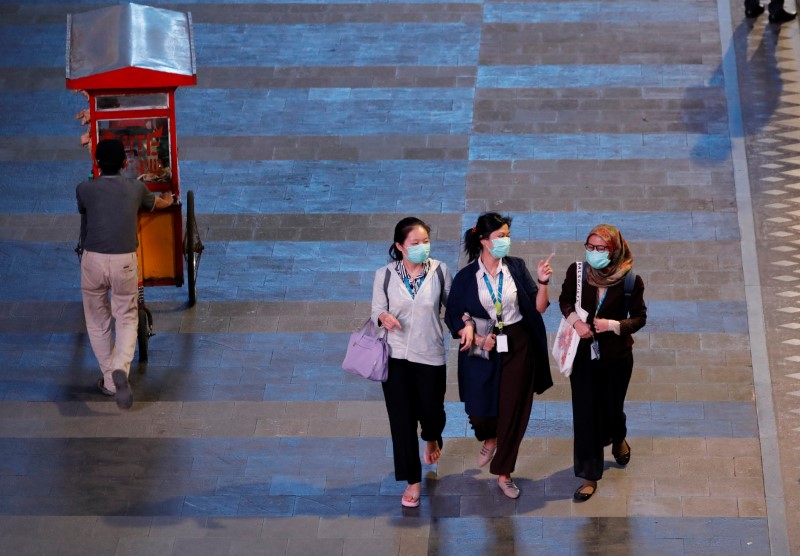By Stanley Widianto
JAKARTA (Reuters) - Faced by a rising death toll from coronavirus and a big jump in infections, Indonesia's president on Thursday called for testing to be stepped up immediately in the world's fourth most populous country.
Less than three weeks since the country of more than 260 million announced its first case of the virus, its death toll had reached 25 - higher than in any other Southeast Asian country.
The number of infections in Indonesia jumped by 82 to 309, which together with daily rises of 110 in Malaysia and 60 in Thailand sent the number of reported infections across Southeast Asia to nearly 2,200.
"I ask that the number of testing kits and the number of test centers are increased and we get more hospitals involved," President Joko Widodo said.
The presidential palace said both he and his wife had tested negative for COVID-19.
Indonesia has faced criticism from medical workers for a slow start to testing that might have more quickly revealed the scale of the problem in an archipelago that spans an area greater than the continental United States.
Indonesia had carried out only 1,592 tests as of Thursday - only a few hundred more than Cambodia despite having over 16 times as many people and being far wealthier.
South Korea, which has been praised for testing that has helped to stem its outbreak, has been carrying out an average of more tests every two hours than Indonesia has done in total. It has carried out over 290,000 tests.
A health ministry official said nearly all of the dead in Indonesia had other medical consitions, such as diabetes, high blood pressure or chronic heart problems. The youngest's age was given was 37.
RELIGIOUS GATHERINGS SUSPENDED
In a measure to curb the spread of the virus, the capital Jakarta will suspend all religious gatherings such as Muslim Friday prayers and church services for two weeks, the governor said.
Indonesia is the world's most populous Muslim-majority country.
A rally of Muslim pilgrims that had already drawn thousands of people to the South Sulawesi province was canceled under pressure from local authorities after a similar event in Malaysia led to hundreds of infections.
After resisting the closure of the event and stating "we are more afraid of God" than the coronavirus on Wednesday, organizer Mustari Bahranuddin said he would cancel the rally, but it would be hard for pilgrims to leave quickly.
With 900 infections, nearly two-thirds linked to the mosque event, Malaysia has more than any other Southeast Asian country, but has only had two deaths so far.
Malaysian authorities were trying to track down about 2,000 Rohingya men who attended the 16,000-strong gathering at a mosque in Kuala Lumpur that led to more than 670 new cases of the virus across Malaysia, Brunei, Cambodia, Singapore, Thailand, Vietnam and the Philippines.
After cases rose in the wake of the mosque event, Malaysia introduced tough internal travel restrictions and banned foreigners from entering and Malaysians from leaving.
The Philippines, where 17 people have died of the virus, said it was banning all foreign visitors to try to stop the virus spreading. More than half of the country's 107 million population is under a month-long quarantine.
Thailand said on Thursday that all arrivals would need to present medical certificates to show they do not have coronavirus.
Indonesia has banned visitors from some countries with large numbers of coronavirus cases, but has not introduced the same level of restrictions as Malaysia or the Philippines.

Indonesia's rupiah currency fell over 4.5% against the dollar on Thursday as the central bank cut interest rates and flagged room for more easing in the face of the crisis.